NRSG263 Principles of Nursing: Mental Health
VerifiedAdded on 2022/09/01
|12
|3242
|18
AI Summary
Contribute Materials
Your contribution can guide someone’s learning journey. Share your
documents today.

Running head: NURSING
NRSG263 Principles of Nursing: Mental Health
Name of the Student
Name of the University
Author Note
NRSG263 Principles of Nursing: Mental Health
Name of the Student
Name of the University
Author Note
Secure Best Marks with AI Grader
Need help grading? Try our AI Grader for instant feedback on your assignments.
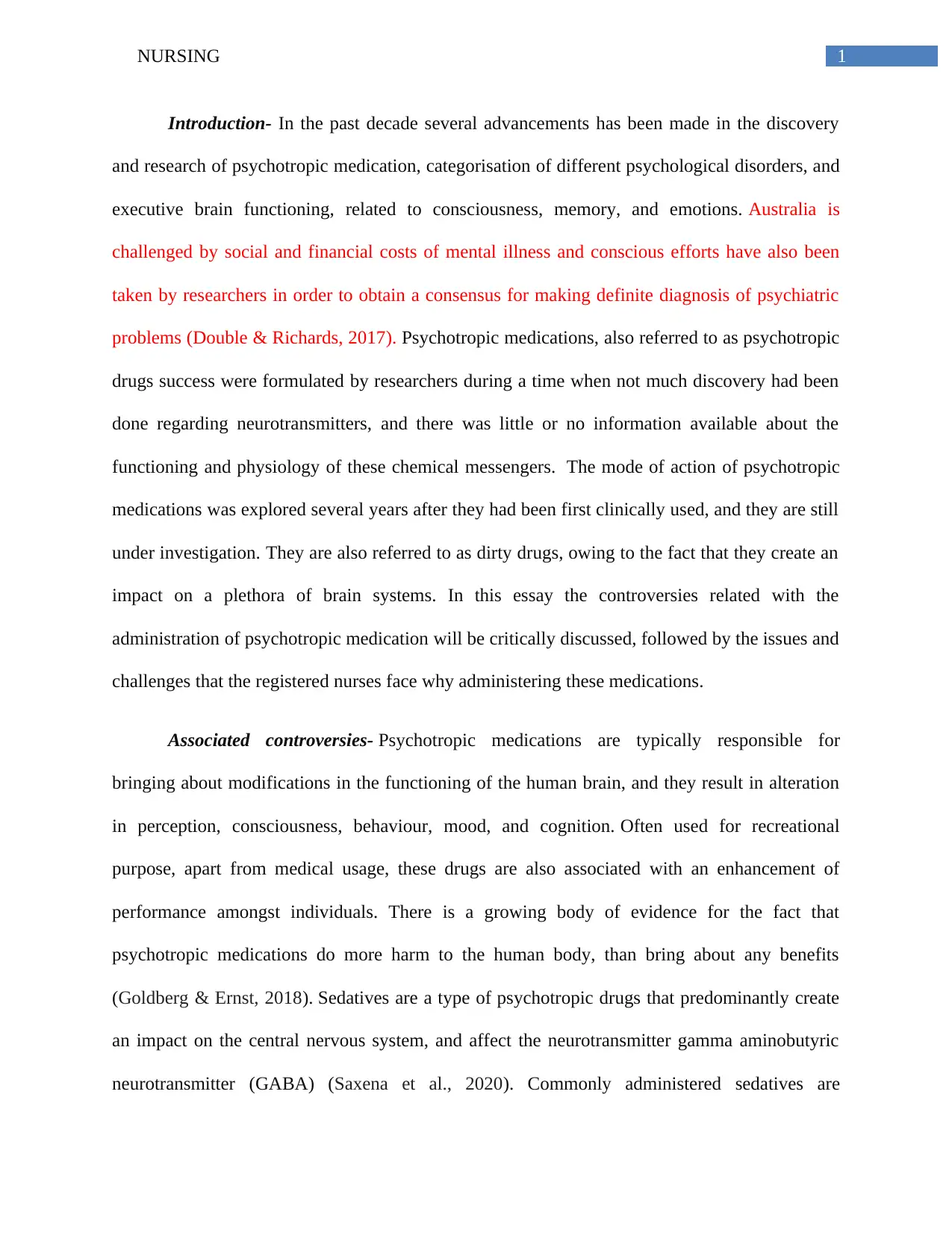
1NURSING
Introduction- In the past decade several advancements has been made in the discovery
and research of psychotropic medication, categorisation of different psychological disorders, and
executive brain functioning, related to consciousness, memory, and emotions. Australia is
challenged by social and financial costs of mental illness and conscious efforts have also been
taken by researchers in order to obtain a consensus for making definite diagnosis of psychiatric
problems (Double & Richards, 2017). Psychotropic medications, also referred to as psychotropic
drugs success were formulated by researchers during a time when not much discovery had been
done regarding neurotransmitters, and there was little or no information available about the
functioning and physiology of these chemical messengers. The mode of action of psychotropic
medications was explored several years after they had been first clinically used, and they are still
under investigation. They are also referred to as dirty drugs, owing to the fact that they create an
impact on a plethora of brain systems. In this essay the controversies related with the
administration of psychotropic medication will be critically discussed, followed by the issues and
challenges that the registered nurses face why administering these medications.
Associated controversies- Psychotropic medications are typically responsible for
bringing about modifications in the functioning of the human brain, and they result in alteration
in perception, consciousness, behaviour, mood, and cognition. Often used for recreational
purpose, apart from medical usage, these drugs are also associated with an enhancement of
performance amongst individuals. There is a growing body of evidence for the fact that
psychotropic medications do more harm to the human body, than bring about any benefits
(Goldberg & Ernst, 2018). Sedatives are a type of psychotropic drugs that predominantly create
an impact on the central nervous system, and affect the neurotransmitter gamma aminobutyric
neurotransmitter (GABA) (Saxena et al., 2020). Commonly administered sedatives are
Introduction- In the past decade several advancements has been made in the discovery
and research of psychotropic medication, categorisation of different psychological disorders, and
executive brain functioning, related to consciousness, memory, and emotions. Australia is
challenged by social and financial costs of mental illness and conscious efforts have also been
taken by researchers in order to obtain a consensus for making definite diagnosis of psychiatric
problems (Double & Richards, 2017). Psychotropic medications, also referred to as psychotropic
drugs success were formulated by researchers during a time when not much discovery had been
done regarding neurotransmitters, and there was little or no information available about the
functioning and physiology of these chemical messengers. The mode of action of psychotropic
medications was explored several years after they had been first clinically used, and they are still
under investigation. They are also referred to as dirty drugs, owing to the fact that they create an
impact on a plethora of brain systems. In this essay the controversies related with the
administration of psychotropic medication will be critically discussed, followed by the issues and
challenges that the registered nurses face why administering these medications.
Associated controversies- Psychotropic medications are typically responsible for
bringing about modifications in the functioning of the human brain, and they result in alteration
in perception, consciousness, behaviour, mood, and cognition. Often used for recreational
purpose, apart from medical usage, these drugs are also associated with an enhancement of
performance amongst individuals. There is a growing body of evidence for the fact that
psychotropic medications do more harm to the human body, than bring about any benefits
(Goldberg & Ernst, 2018). Sedatives are a type of psychotropic drugs that predominantly create
an impact on the central nervous system, and affect the neurotransmitter gamma aminobutyric
neurotransmitter (GABA) (Saxena et al., 2020). Commonly administered sedatives are
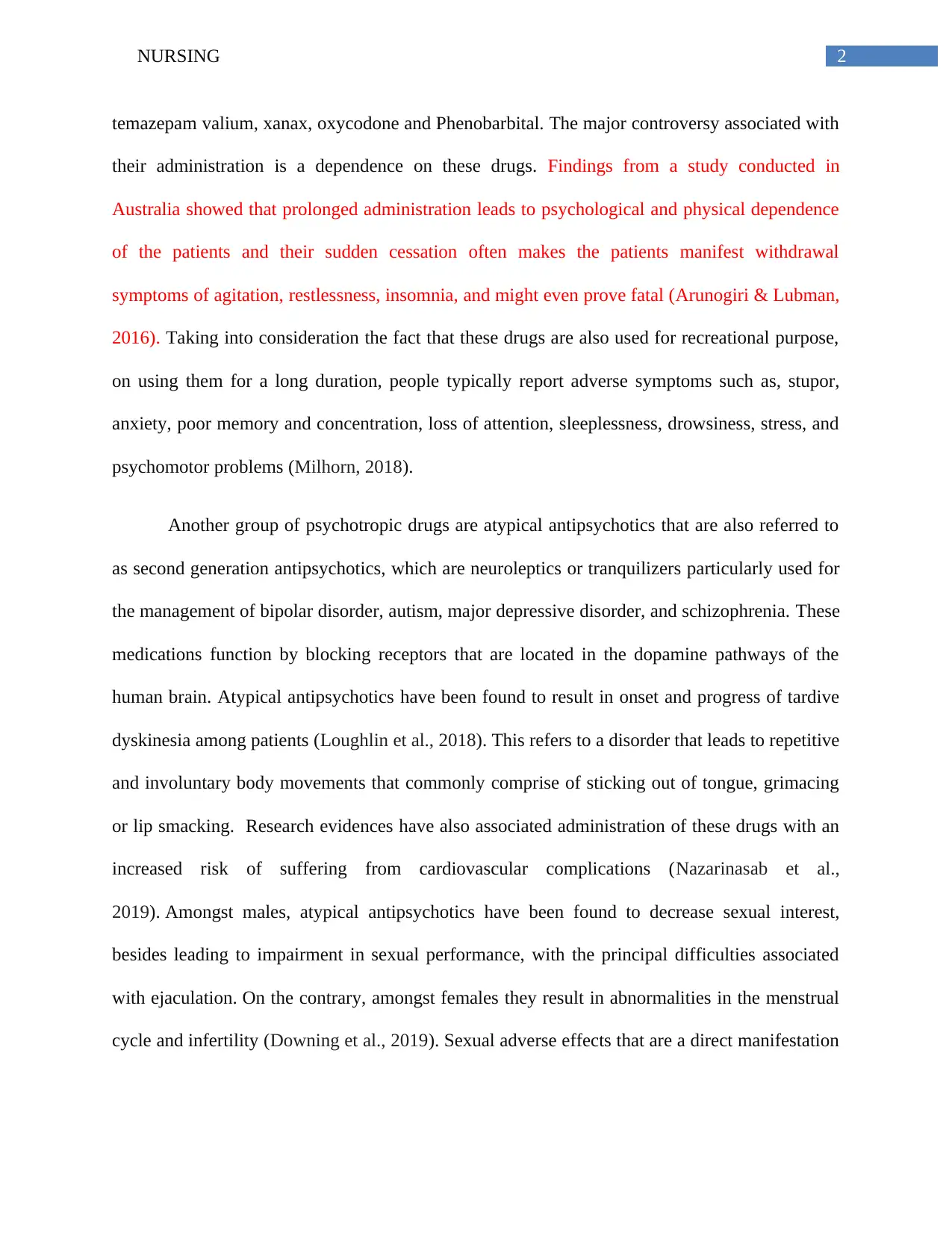
2NURSING
temazepam valium, xanax, oxycodone and Phenobarbital. The major controversy associated with
their administration is a dependence on these drugs. Findings from a study conducted in
Australia showed that prolonged administration leads to psychological and physical dependence
of the patients and their sudden cessation often makes the patients manifest withdrawal
symptoms of agitation, restlessness, insomnia, and might even prove fatal (Arunogiri & Lubman,
2016). Taking into consideration the fact that these drugs are also used for recreational purpose,
on using them for a long duration, people typically report adverse symptoms such as, stupor,
anxiety, poor memory and concentration, loss of attention, sleeplessness, drowsiness, stress, and
psychomotor problems (Milhorn, 2018).
Another group of psychotropic drugs are atypical antipsychotics that are also referred to
as second generation antipsychotics, which are neuroleptics or tranquilizers particularly used for
the management of bipolar disorder, autism, major depressive disorder, and schizophrenia. These
medications function by blocking receptors that are located in the dopamine pathways of the
human brain. Atypical antipsychotics have been found to result in onset and progress of tardive
dyskinesia among patients (Loughlin et al., 2018). This refers to a disorder that leads to repetitive
and involuntary body movements that commonly comprise of sticking out of tongue, grimacing
or lip smacking. Research evidences have also associated administration of these drugs with an
increased risk of suffering from cardiovascular complications (Nazarinasab et al.,
2019). Amongst males, atypical antipsychotics have been found to decrease sexual interest,
besides leading to impairment in sexual performance, with the principal difficulties associated
with ejaculation. On the contrary, amongst females they result in abnormalities in the menstrual
cycle and infertility (Downing et al., 2019). Sexual adverse effects that are a direct manifestation
temazepam valium, xanax, oxycodone and Phenobarbital. The major controversy associated with
their administration is a dependence on these drugs. Findings from a study conducted in
Australia showed that prolonged administration leads to psychological and physical dependence
of the patients and their sudden cessation often makes the patients manifest withdrawal
symptoms of agitation, restlessness, insomnia, and might even prove fatal (Arunogiri & Lubman,
2016). Taking into consideration the fact that these drugs are also used for recreational purpose,
on using them for a long duration, people typically report adverse symptoms such as, stupor,
anxiety, poor memory and concentration, loss of attention, sleeplessness, drowsiness, stress, and
psychomotor problems (Milhorn, 2018).
Another group of psychotropic drugs are atypical antipsychotics that are also referred to
as second generation antipsychotics, which are neuroleptics or tranquilizers particularly used for
the management of bipolar disorder, autism, major depressive disorder, and schizophrenia. These
medications function by blocking receptors that are located in the dopamine pathways of the
human brain. Atypical antipsychotics have been found to result in onset and progress of tardive
dyskinesia among patients (Loughlin et al., 2018). This refers to a disorder that leads to repetitive
and involuntary body movements that commonly comprise of sticking out of tongue, grimacing
or lip smacking. Research evidences have also associated administration of these drugs with an
increased risk of suffering from cardiovascular complications (Nazarinasab et al.,
2019). Amongst males, atypical antipsychotics have been found to decrease sexual interest,
besides leading to impairment in sexual performance, with the principal difficulties associated
with ejaculation. On the contrary, amongst females they result in abnormalities in the menstrual
cycle and infertility (Downing et al., 2019). Sexual adverse effects that are a direct manifestation
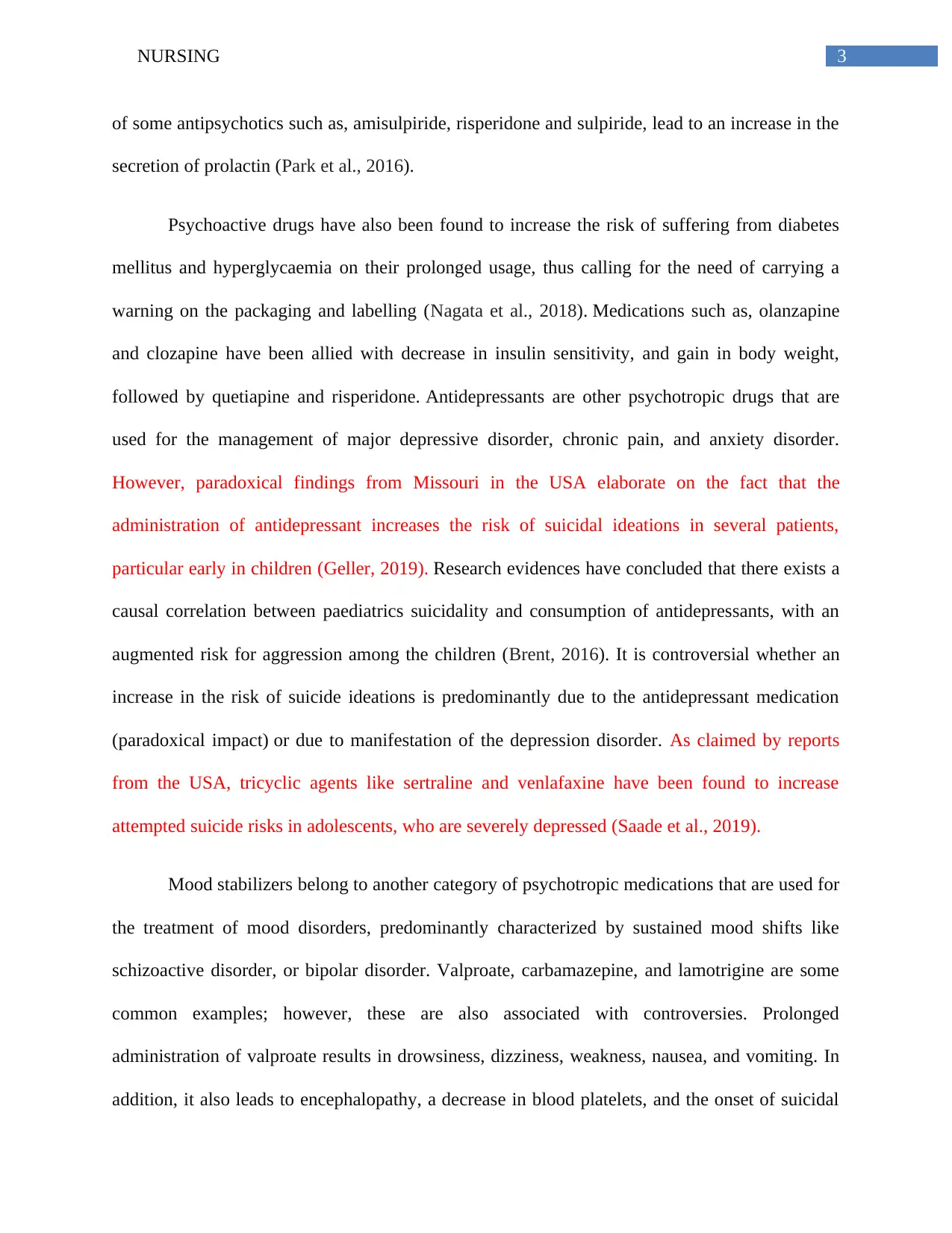
3NURSING
of some antipsychotics such as, amisulpiride, risperidone and sulpiride, lead to an increase in the
secretion of prolactin (Park et al., 2016).
Psychoactive drugs have also been found to increase the risk of suffering from diabetes
mellitus and hyperglycaemia on their prolonged usage, thus calling for the need of carrying a
warning on the packaging and labelling (Nagata et al., 2018). Medications such as, olanzapine
and clozapine have been allied with decrease in insulin sensitivity, and gain in body weight,
followed by quetiapine and risperidone. Antidepressants are other psychotropic drugs that are
used for the management of major depressive disorder, chronic pain, and anxiety disorder.
However, paradoxical findings from Missouri in the USA elaborate on the fact that the
administration of antidepressant increases the risk of suicidal ideations in several patients,
particular early in children (Geller, 2019). Research evidences have concluded that there exists a
causal correlation between paediatrics suicidality and consumption of antidepressants, with an
augmented risk for aggression among the children (Brent, 2016). It is controversial whether an
increase in the risk of suicide ideations is predominantly due to the antidepressant medication
(paradoxical impact) or due to manifestation of the depression disorder. As claimed by reports
from the USA, tricyclic agents like sertraline and venlafaxine have been found to increase
attempted suicide risks in adolescents, who are severely depressed (Saade et al., 2019).
Mood stabilizers belong to another category of psychotropic medications that are used for
the treatment of mood disorders, predominantly characterized by sustained mood shifts like
schizoactive disorder, or bipolar disorder. Valproate, carbamazepine, and lamotrigine are some
common examples; however, these are also associated with controversies. Prolonged
administration of valproate results in drowsiness, dizziness, weakness, nausea, and vomiting. In
addition, it also leads to encephalopathy, a decrease in blood platelets, and the onset of suicidal
of some antipsychotics such as, amisulpiride, risperidone and sulpiride, lead to an increase in the
secretion of prolactin (Park et al., 2016).
Psychoactive drugs have also been found to increase the risk of suffering from diabetes
mellitus and hyperglycaemia on their prolonged usage, thus calling for the need of carrying a
warning on the packaging and labelling (Nagata et al., 2018). Medications such as, olanzapine
and clozapine have been allied with decrease in insulin sensitivity, and gain in body weight,
followed by quetiapine and risperidone. Antidepressants are other psychotropic drugs that are
used for the management of major depressive disorder, chronic pain, and anxiety disorder.
However, paradoxical findings from Missouri in the USA elaborate on the fact that the
administration of antidepressant increases the risk of suicidal ideations in several patients,
particular early in children (Geller, 2019). Research evidences have concluded that there exists a
causal correlation between paediatrics suicidality and consumption of antidepressants, with an
augmented risk for aggression among the children (Brent, 2016). It is controversial whether an
increase in the risk of suicide ideations is predominantly due to the antidepressant medication
(paradoxical impact) or due to manifestation of the depression disorder. As claimed by reports
from the USA, tricyclic agents like sertraline and venlafaxine have been found to increase
attempted suicide risks in adolescents, who are severely depressed (Saade et al., 2019).
Mood stabilizers belong to another category of psychotropic medications that are used for
the treatment of mood disorders, predominantly characterized by sustained mood shifts like
schizoactive disorder, or bipolar disorder. Valproate, carbamazepine, and lamotrigine are some
common examples; however, these are also associated with controversies. Prolonged
administration of valproate results in drowsiness, dizziness, weakness, nausea, and vomiting. In
addition, it also leads to encephalopathy, a decrease in blood platelets, and the onset of suicidal
Secure Best Marks with AI Grader
Need help grading? Try our AI Grader for instant feedback on your assignments.
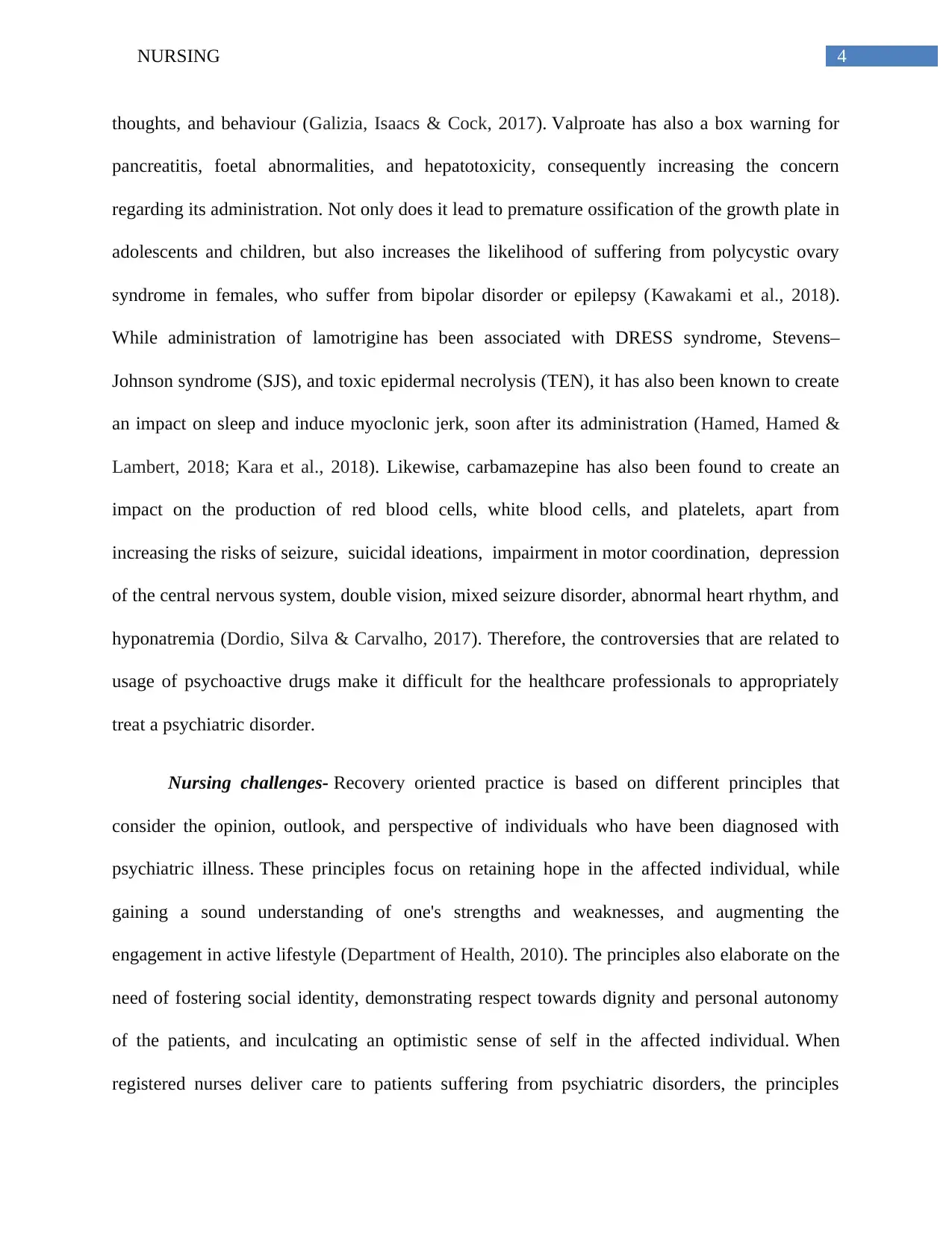
4NURSING
thoughts, and behaviour (Galizia, Isaacs & Cock, 2017). Valproate has also a box warning for
pancreatitis, foetal abnormalities, and hepatotoxicity, consequently increasing the concern
regarding its administration. Not only does it lead to premature ossification of the growth plate in
adolescents and children, but also increases the likelihood of suffering from polycystic ovary
syndrome in females, who suffer from bipolar disorder or epilepsy (Kawakami et al., 2018).
While administration of lamotrigine has been associated with DRESS syndrome, Stevens–
Johnson syndrome (SJS), and toxic epidermal necrolysis (TEN), it has also been known to create
an impact on sleep and induce myoclonic jerk, soon after its administration (Hamed, Hamed &
Lambert, 2018; Kara et al., 2018). Likewise, carbamazepine has also been found to create an
impact on the production of red blood cells, white blood cells, and platelets, apart from
increasing the risks of seizure, suicidal ideations, impairment in motor coordination, depression
of the central nervous system, double vision, mixed seizure disorder, abnormal heart rhythm, and
hyponatremia (Dordio, Silva & Carvalho, 2017). Therefore, the controversies that are related to
usage of psychoactive drugs make it difficult for the healthcare professionals to appropriately
treat a psychiatric disorder.
Nursing challenges- Recovery oriented practice is based on different principles that
consider the opinion, outlook, and perspective of individuals who have been diagnosed with
psychiatric illness. These principles focus on retaining hope in the affected individual, while
gaining a sound understanding of one's strengths and weaknesses, and augmenting the
engagement in active lifestyle (Department of Health, 2010). The principles also elaborate on the
need of fostering social identity, demonstrating respect towards dignity and personal autonomy
of the patients, and inculcating an optimistic sense of self in the affected individual. When
registered nurses deliver care to patients suffering from psychiatric disorders, the principles
thoughts, and behaviour (Galizia, Isaacs & Cock, 2017). Valproate has also a box warning for
pancreatitis, foetal abnormalities, and hepatotoxicity, consequently increasing the concern
regarding its administration. Not only does it lead to premature ossification of the growth plate in
adolescents and children, but also increases the likelihood of suffering from polycystic ovary
syndrome in females, who suffer from bipolar disorder or epilepsy (Kawakami et al., 2018).
While administration of lamotrigine has been associated with DRESS syndrome, Stevens–
Johnson syndrome (SJS), and toxic epidermal necrolysis (TEN), it has also been known to create
an impact on sleep and induce myoclonic jerk, soon after its administration (Hamed, Hamed &
Lambert, 2018; Kara et al., 2018). Likewise, carbamazepine has also been found to create an
impact on the production of red blood cells, white blood cells, and platelets, apart from
increasing the risks of seizure, suicidal ideations, impairment in motor coordination, depression
of the central nervous system, double vision, mixed seizure disorder, abnormal heart rhythm, and
hyponatremia (Dordio, Silva & Carvalho, 2017). Therefore, the controversies that are related to
usage of psychoactive drugs make it difficult for the healthcare professionals to appropriately
treat a psychiatric disorder.
Nursing challenges- Recovery oriented practice is based on different principles that
consider the opinion, outlook, and perspective of individuals who have been diagnosed with
psychiatric illness. These principles focus on retaining hope in the affected individual, while
gaining a sound understanding of one's strengths and weaknesses, and augmenting the
engagement in active lifestyle (Department of Health, 2010). The principles also elaborate on the
need of fostering social identity, demonstrating respect towards dignity and personal autonomy
of the patients, and inculcating an optimistic sense of self in the affected individual. When
registered nurses deliver care to patients suffering from psychiatric disorders, the principles
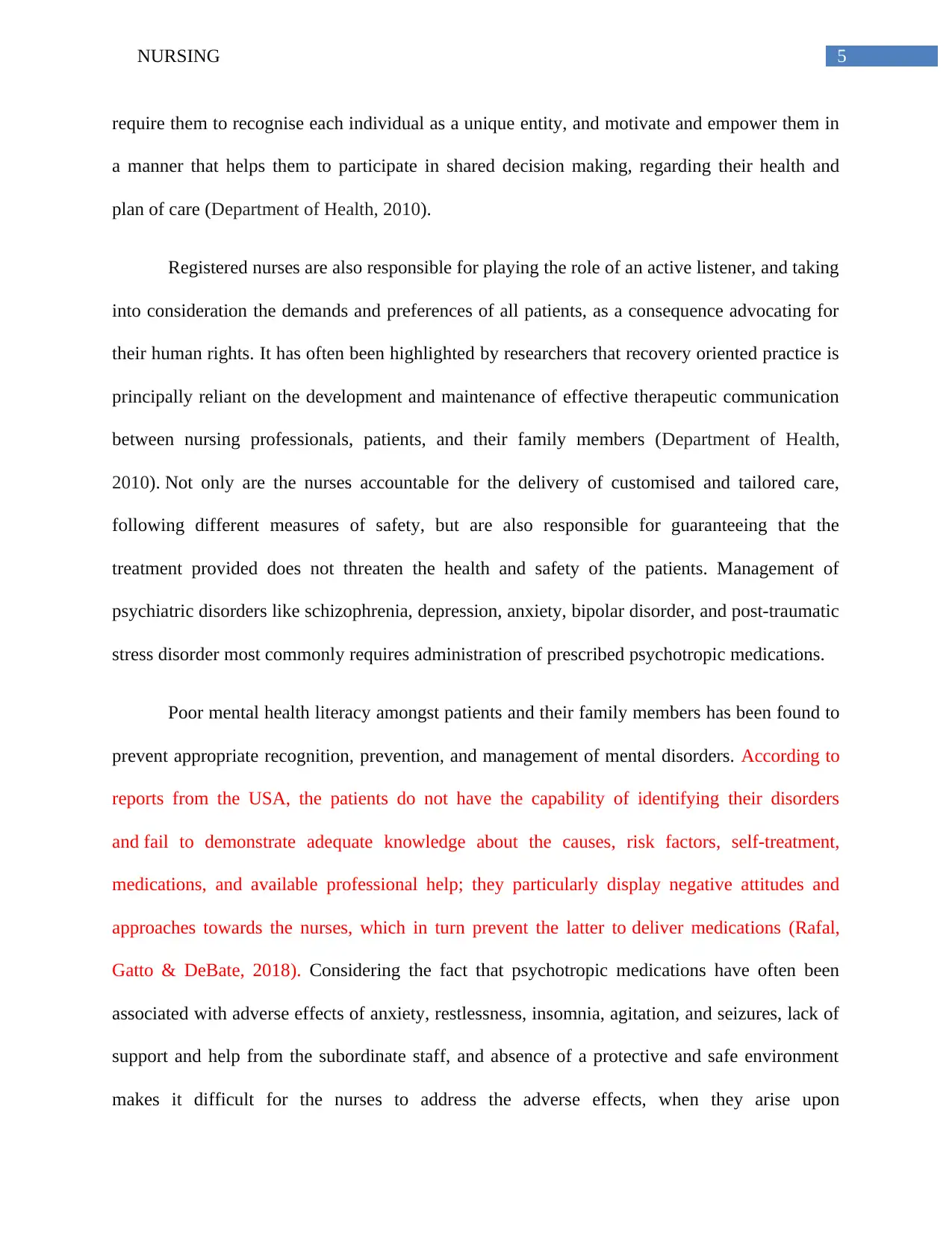
5NURSING
require them to recognise each individual as a unique entity, and motivate and empower them in
a manner that helps them to participate in shared decision making, regarding their health and
plan of care (Department of Health, 2010).
Registered nurses are also responsible for playing the role of an active listener, and taking
into consideration the demands and preferences of all patients, as a consequence advocating for
their human rights. It has often been highlighted by researchers that recovery oriented practice is
principally reliant on the development and maintenance of effective therapeutic communication
between nursing professionals, patients, and their family members (Department of Health,
2010). Not only are the nurses accountable for the delivery of customised and tailored care,
following different measures of safety, but are also responsible for guaranteeing that the
treatment provided does not threaten the health and safety of the patients. Management of
psychiatric disorders like schizophrenia, depression, anxiety, bipolar disorder, and post-traumatic
stress disorder most commonly requires administration of prescribed psychotropic medications.
Poor mental health literacy amongst patients and their family members has been found to
prevent appropriate recognition, prevention, and management of mental disorders. According to
reports from the USA, the patients do not have the capability of identifying their disorders
and fail to demonstrate adequate knowledge about the causes, risk factors, self-treatment,
medications, and available professional help; they particularly display negative attitudes and
approaches towards the nurses, which in turn prevent the latter to deliver medications (Rafal,
Gatto & DeBate, 2018). Considering the fact that psychotropic medications have often been
associated with adverse effects of anxiety, restlessness, insomnia, agitation, and seizures, lack of
support and help from the subordinate staff, and absence of a protective and safe environment
makes it difficult for the nurses to address the adverse effects, when they arise upon
require them to recognise each individual as a unique entity, and motivate and empower them in
a manner that helps them to participate in shared decision making, regarding their health and
plan of care (Department of Health, 2010).
Registered nurses are also responsible for playing the role of an active listener, and taking
into consideration the demands and preferences of all patients, as a consequence advocating for
their human rights. It has often been highlighted by researchers that recovery oriented practice is
principally reliant on the development and maintenance of effective therapeutic communication
between nursing professionals, patients, and their family members (Department of Health,
2010). Not only are the nurses accountable for the delivery of customised and tailored care,
following different measures of safety, but are also responsible for guaranteeing that the
treatment provided does not threaten the health and safety of the patients. Management of
psychiatric disorders like schizophrenia, depression, anxiety, bipolar disorder, and post-traumatic
stress disorder most commonly requires administration of prescribed psychotropic medications.
Poor mental health literacy amongst patients and their family members has been found to
prevent appropriate recognition, prevention, and management of mental disorders. According to
reports from the USA, the patients do not have the capability of identifying their disorders
and fail to demonstrate adequate knowledge about the causes, risk factors, self-treatment,
medications, and available professional help; they particularly display negative attitudes and
approaches towards the nurses, which in turn prevent the latter to deliver medications (Rafal,
Gatto & DeBate, 2018). Considering the fact that psychotropic medications have often been
associated with adverse effects of anxiety, restlessness, insomnia, agitation, and seizures, lack of
support and help from the subordinate staff, and absence of a protective and safe environment
makes it difficult for the nurses to address the adverse effects, when they arise upon
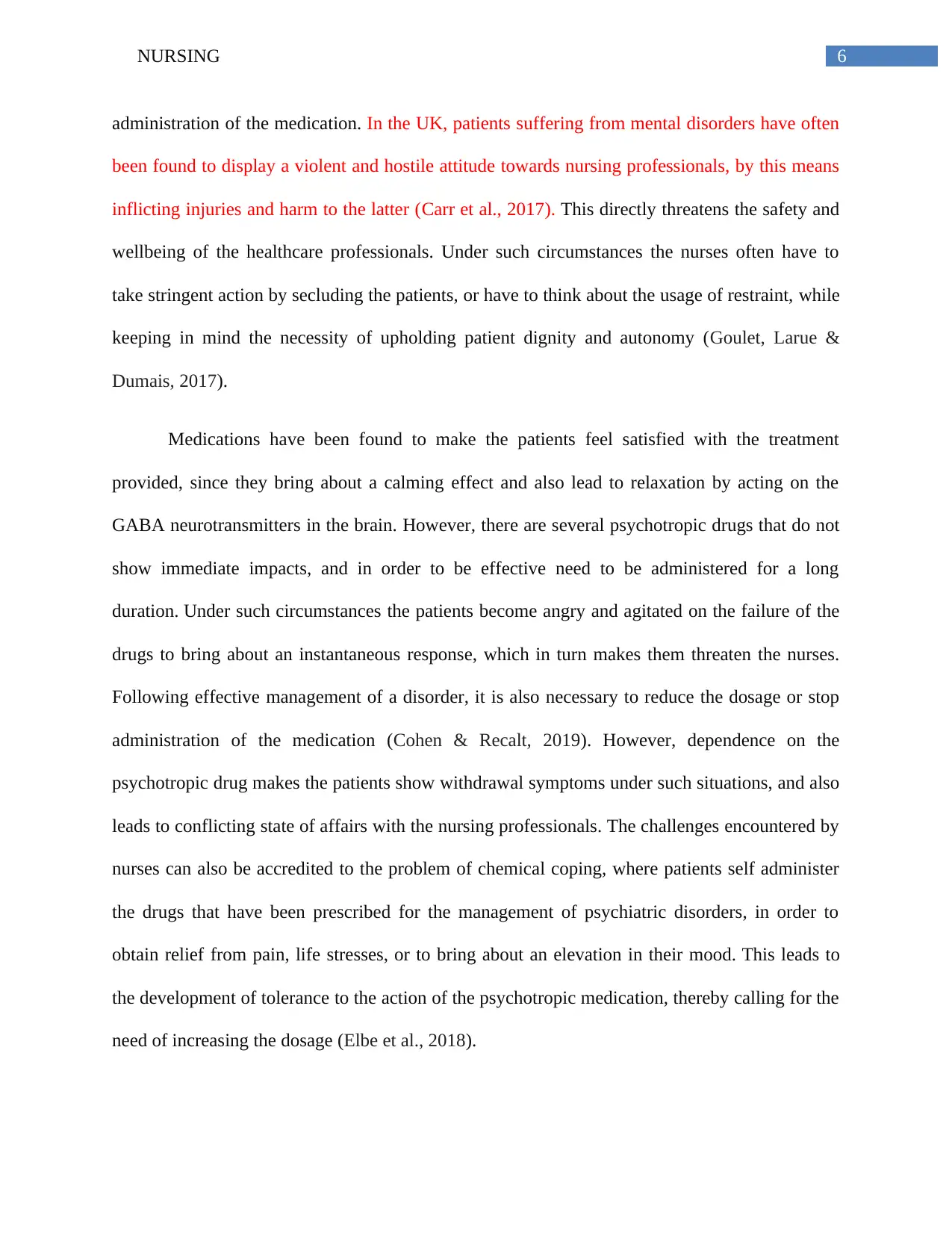
6NURSING
administration of the medication. In the UK, patients suffering from mental disorders have often
been found to display a violent and hostile attitude towards nursing professionals, by this means
inflicting injuries and harm to the latter (Carr et al., 2017). This directly threatens the safety and
wellbeing of the healthcare professionals. Under such circumstances the nurses often have to
take stringent action by secluding the patients, or have to think about the usage of restraint, while
keeping in mind the necessity of upholding patient dignity and autonomy (Goulet, Larue &
Dumais, 2017).
Medications have been found to make the patients feel satisfied with the treatment
provided, since they bring about a calming effect and also lead to relaxation by acting on the
GABA neurotransmitters in the brain. However, there are several psychotropic drugs that do not
show immediate impacts, and in order to be effective need to be administered for a long
duration. Under such circumstances the patients become angry and agitated on the failure of the
drugs to bring about an instantaneous response, which in turn makes them threaten the nurses.
Following effective management of a disorder, it is also necessary to reduce the dosage or stop
administration of the medication (Cohen & Recalt, 2019). However, dependence on the
psychotropic drug makes the patients show withdrawal symptoms under such situations, and also
leads to conflicting state of affairs with the nursing professionals. The challenges encountered by
nurses can also be accredited to the problem of chemical coping, where patients self administer
the drugs that have been prescribed for the management of psychiatric disorders, in order to
obtain relief from pain, life stresses, or to bring about an elevation in their mood. This leads to
the development of tolerance to the action of the psychotropic medication, thereby calling for the
need of increasing the dosage (Elbe et al., 2018).
administration of the medication. In the UK, patients suffering from mental disorders have often
been found to display a violent and hostile attitude towards nursing professionals, by this means
inflicting injuries and harm to the latter (Carr et al., 2017). This directly threatens the safety and
wellbeing of the healthcare professionals. Under such circumstances the nurses often have to
take stringent action by secluding the patients, or have to think about the usage of restraint, while
keeping in mind the necessity of upholding patient dignity and autonomy (Goulet, Larue &
Dumais, 2017).
Medications have been found to make the patients feel satisfied with the treatment
provided, since they bring about a calming effect and also lead to relaxation by acting on the
GABA neurotransmitters in the brain. However, there are several psychotropic drugs that do not
show immediate impacts, and in order to be effective need to be administered for a long
duration. Under such circumstances the patients become angry and agitated on the failure of the
drugs to bring about an instantaneous response, which in turn makes them threaten the nurses.
Following effective management of a disorder, it is also necessary to reduce the dosage or stop
administration of the medication (Cohen & Recalt, 2019). However, dependence on the
psychotropic drug makes the patients show withdrawal symptoms under such situations, and also
leads to conflicting state of affairs with the nursing professionals. The challenges encountered by
nurses can also be accredited to the problem of chemical coping, where patients self administer
the drugs that have been prescribed for the management of psychiatric disorders, in order to
obtain relief from pain, life stresses, or to bring about an elevation in their mood. This leads to
the development of tolerance to the action of the psychotropic medication, thereby calling for the
need of increasing the dosage (Elbe et al., 2018).
Paraphrase This Document
Need a fresh take? Get an instant paraphrase of this document with our AI Paraphraser
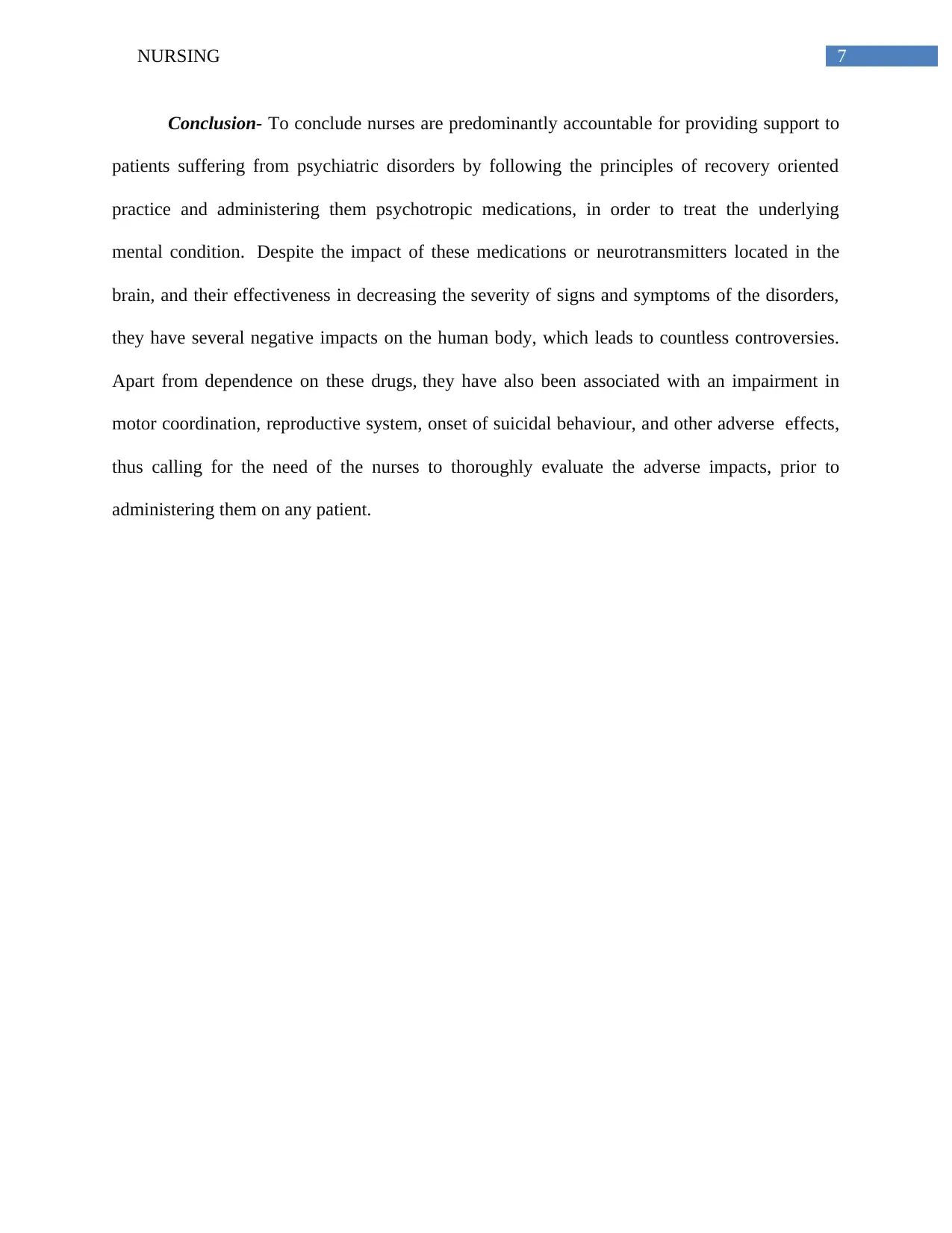
7NURSING
Conclusion- To conclude nurses are predominantly accountable for providing support to
patients suffering from psychiatric disorders by following the principles of recovery oriented
practice and administering them psychotropic medications, in order to treat the underlying
mental condition. Despite the impact of these medications or neurotransmitters located in the
brain, and their effectiveness in decreasing the severity of signs and symptoms of the disorders,
they have several negative impacts on the human body, which leads to countless controversies.
Apart from dependence on these drugs, they have also been associated with an impairment in
motor coordination, reproductive system, onset of suicidal behaviour, and other adverse effects,
thus calling for the need of the nurses to thoroughly evaluate the adverse impacts, prior to
administering them on any patient.
Conclusion- To conclude nurses are predominantly accountable for providing support to
patients suffering from psychiatric disorders by following the principles of recovery oriented
practice and administering them psychotropic medications, in order to treat the underlying
mental condition. Despite the impact of these medications or neurotransmitters located in the
brain, and their effectiveness in decreasing the severity of signs and symptoms of the disorders,
they have several negative impacts on the human body, which leads to countless controversies.
Apart from dependence on these drugs, they have also been associated with an impairment in
motor coordination, reproductive system, onset of suicidal behaviour, and other adverse effects,
thus calling for the need of the nurses to thoroughly evaluate the adverse impacts, prior to
administering them on any patient.
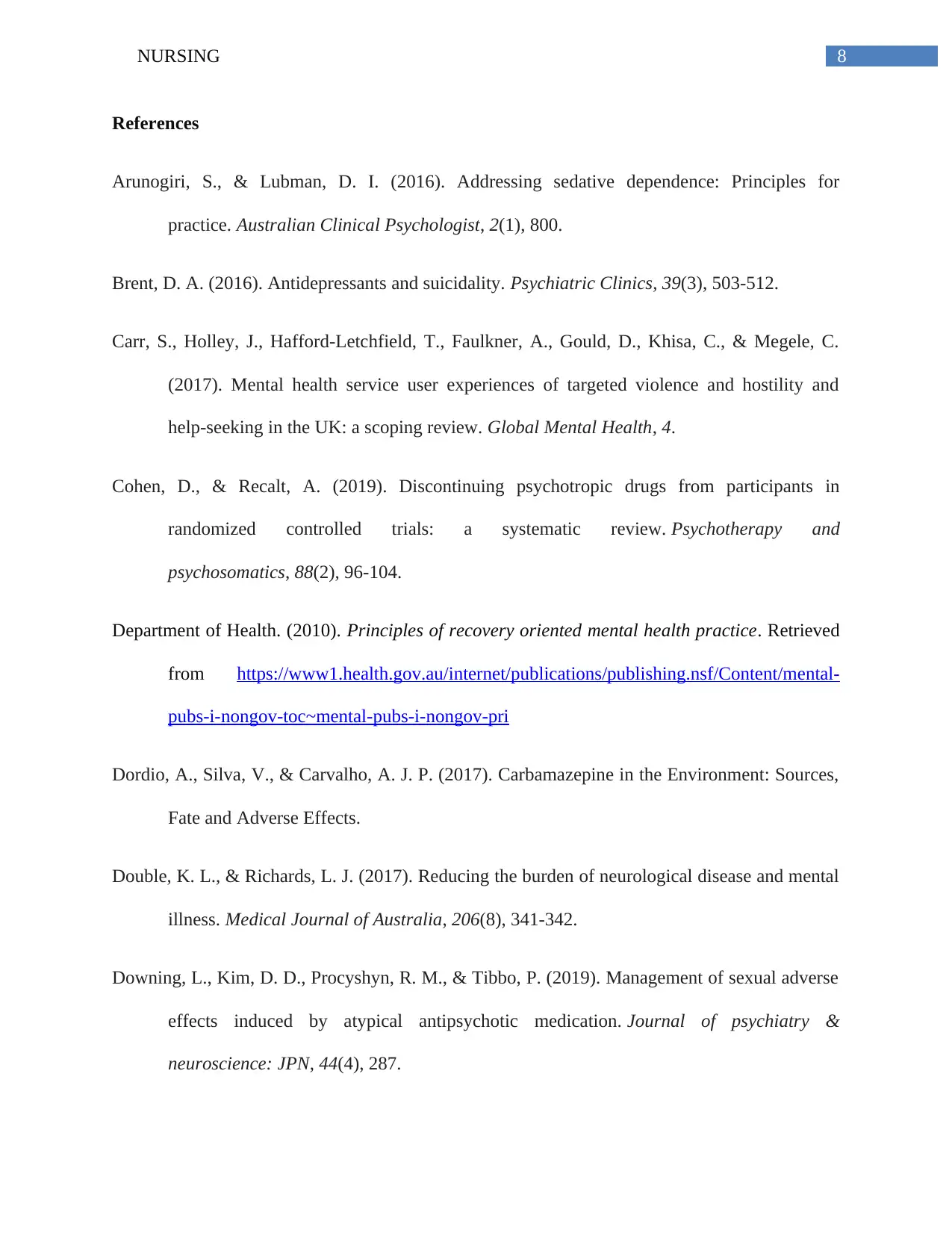
8NURSING
References
Arunogiri, S., & Lubman, D. I. (2016). Addressing sedative dependence: Principles for
practice. Australian Clinical Psychologist, 2(1), 800.
Brent, D. A. (2016). Antidepressants and suicidality. Psychiatric Clinics, 39(3), 503-512.
Carr, S., Holley, J., Hafford-Letchfield, T., Faulkner, A., Gould, D., Khisa, C., & Megele, C.
(2017). Mental health service user experiences of targeted violence and hostility and
help-seeking in the UK: a scoping review. Global Mental Health, 4.
Cohen, D., & Recalt, A. (2019). Discontinuing psychotropic drugs from participants in
randomized controlled trials: a systematic review. Psychotherapy and
psychosomatics, 88(2), 96-104.
Department of Health. (2010). Principles of recovery oriented mental health practice. Retrieved
from https://www1.health.gov.au/internet/publications/publishing.nsf/Content/mental-
pubs-i-nongov-toc~mental-pubs-i-nongov-pri
Dordio, A., Silva, V., & Carvalho, A. J. P. (2017). Carbamazepine in the Environment: Sources,
Fate and Adverse Effects.
Double, K. L., & Richards, L. J. (2017). Reducing the burden of neurological disease and mental
illness. Medical Journal of Australia, 206(8), 341-342.
Downing, L., Kim, D. D., Procyshyn, R. M., & Tibbo, P. (2019). Management of sexual adverse
effects induced by atypical antipsychotic medication. Journal of psychiatry &
neuroscience: JPN, 44(4), 287.
References
Arunogiri, S., & Lubman, D. I. (2016). Addressing sedative dependence: Principles for
practice. Australian Clinical Psychologist, 2(1), 800.
Brent, D. A. (2016). Antidepressants and suicidality. Psychiatric Clinics, 39(3), 503-512.
Carr, S., Holley, J., Hafford-Letchfield, T., Faulkner, A., Gould, D., Khisa, C., & Megele, C.
(2017). Mental health service user experiences of targeted violence and hostility and
help-seeking in the UK: a scoping review. Global Mental Health, 4.
Cohen, D., & Recalt, A. (2019). Discontinuing psychotropic drugs from participants in
randomized controlled trials: a systematic review. Psychotherapy and
psychosomatics, 88(2), 96-104.
Department of Health. (2010). Principles of recovery oriented mental health practice. Retrieved
from https://www1.health.gov.au/internet/publications/publishing.nsf/Content/mental-
pubs-i-nongov-toc~mental-pubs-i-nongov-pri
Dordio, A., Silva, V., & Carvalho, A. J. P. (2017). Carbamazepine in the Environment: Sources,
Fate and Adverse Effects.
Double, K. L., & Richards, L. J. (2017). Reducing the burden of neurological disease and mental
illness. Medical Journal of Australia, 206(8), 341-342.
Downing, L., Kim, D. D., Procyshyn, R. M., & Tibbo, P. (2019). Management of sexual adverse
effects induced by atypical antipsychotic medication. Journal of psychiatry &
neuroscience: JPN, 44(4), 287.
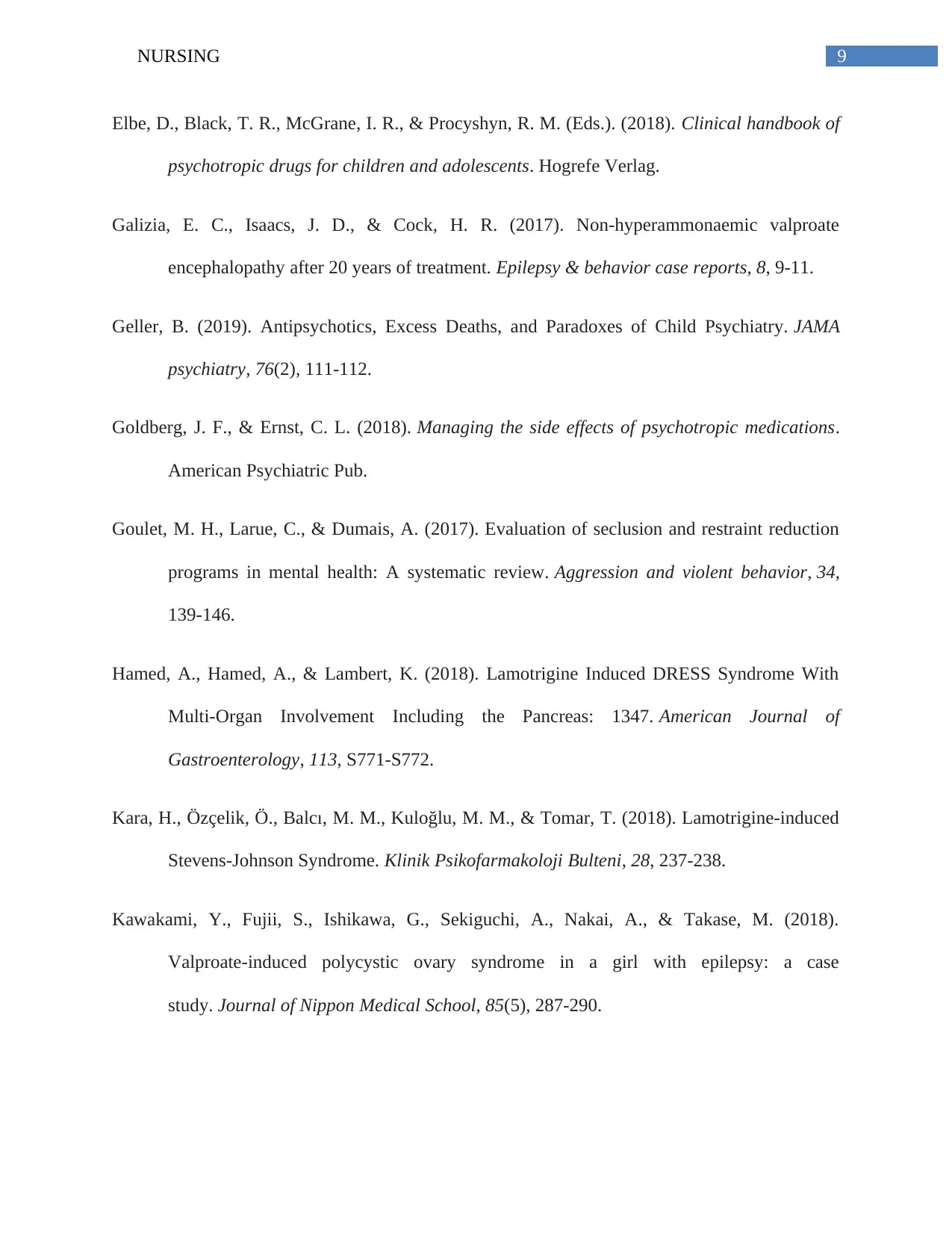
9NURSING
Elbe, D., Black, T. R., McGrane, I. R., & Procyshyn, R. M. (Eds.). (2018). Clinical handbook of
psychotropic drugs for children and adolescents. Hogrefe Verlag.
Galizia, E. C., Isaacs, J. D., & Cock, H. R. (2017). Non-hyperammonaemic valproate
encephalopathy after 20 years of treatment. Epilepsy & behavior case reports, 8, 9-11.
Geller, B. (2019). Antipsychotics, Excess Deaths, and Paradoxes of Child Psychiatry. JAMA
psychiatry, 76(2), 111-112.
Goldberg, J. F., & Ernst, C. L. (2018). Managing the side effects of psychotropic medications.
American Psychiatric Pub.
Goulet, M. H., Larue, C., & Dumais, A. (2017). Evaluation of seclusion and restraint reduction
programs in mental health: A systematic review. Aggression and violent behavior, 34,
139-146.
Hamed, A., Hamed, A., & Lambert, K. (2018). Lamotrigine Induced DRESS Syndrome With
Multi-Organ Involvement Including the Pancreas: 1347. American Journal of
Gastroenterology, 113, S771-S772.
Kara, H., Özçelik, Ö., Balcı, M. M., Kuloğlu, M. M., & Tomar, T. (2018). Lamotrigine-induced
Stevens-Johnson Syndrome. Klinik Psikofarmakoloji Bulteni, 28, 237-238.
Kawakami, Y., Fujii, S., Ishikawa, G., Sekiguchi, A., Nakai, A., & Takase, M. (2018).
Valproate-induced polycystic ovary syndrome in a girl with epilepsy: a case
study. Journal of Nippon Medical School, 85(5), 287-290.
Elbe, D., Black, T. R., McGrane, I. R., & Procyshyn, R. M. (Eds.). (2018). Clinical handbook of
psychotropic drugs for children and adolescents. Hogrefe Verlag.
Galizia, E. C., Isaacs, J. D., & Cock, H. R. (2017). Non-hyperammonaemic valproate
encephalopathy after 20 years of treatment. Epilepsy & behavior case reports, 8, 9-11.
Geller, B. (2019). Antipsychotics, Excess Deaths, and Paradoxes of Child Psychiatry. JAMA
psychiatry, 76(2), 111-112.
Goldberg, J. F., & Ernst, C. L. (2018). Managing the side effects of psychotropic medications.
American Psychiatric Pub.
Goulet, M. H., Larue, C., & Dumais, A. (2017). Evaluation of seclusion and restraint reduction
programs in mental health: A systematic review. Aggression and violent behavior, 34,
139-146.
Hamed, A., Hamed, A., & Lambert, K. (2018). Lamotrigine Induced DRESS Syndrome With
Multi-Organ Involvement Including the Pancreas: 1347. American Journal of
Gastroenterology, 113, S771-S772.
Kara, H., Özçelik, Ö., Balcı, M. M., Kuloğlu, M. M., & Tomar, T. (2018). Lamotrigine-induced
Stevens-Johnson Syndrome. Klinik Psikofarmakoloji Bulteni, 28, 237-238.
Kawakami, Y., Fujii, S., Ishikawa, G., Sekiguchi, A., Nakai, A., & Takase, M. (2018).
Valproate-induced polycystic ovary syndrome in a girl with epilepsy: a case
study. Journal of Nippon Medical School, 85(5), 287-290.
Secure Best Marks with AI Grader
Need help grading? Try our AI Grader for instant feedback on your assignments.
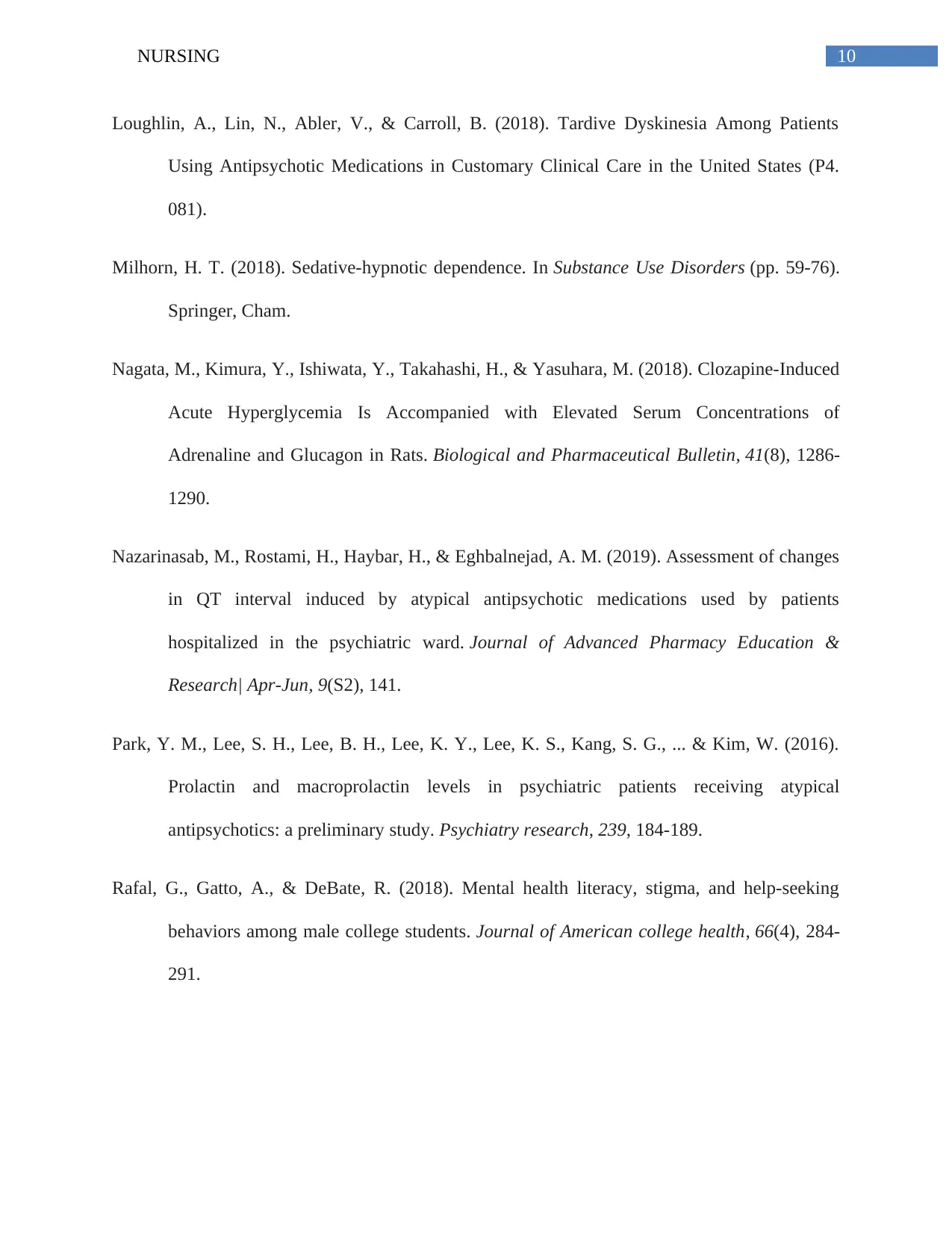
10NURSING
Loughlin, A., Lin, N., Abler, V., & Carroll, B. (2018). Tardive Dyskinesia Among Patients
Using Antipsychotic Medications in Customary Clinical Care in the United States (P4.
081).
Milhorn, H. T. (2018). Sedative-hypnotic dependence. In Substance Use Disorders (pp. 59-76).
Springer, Cham.
Nagata, M., Kimura, Y., Ishiwata, Y., Takahashi, H., & Yasuhara, M. (2018). Clozapine-Induced
Acute Hyperglycemia Is Accompanied with Elevated Serum Concentrations of
Adrenaline and Glucagon in Rats. Biological and Pharmaceutical Bulletin, 41(8), 1286-
1290.
Nazarinasab, M., Rostami, H., Haybar, H., & Eghbalnejad, A. M. (2019). Assessment of changes
in QT interval induced by atypical antipsychotic medications used by patients
hospitalized in the psychiatric ward. Journal of Advanced Pharmacy Education &
Research| Apr-Jun, 9(S2), 141.
Park, Y. M., Lee, S. H., Lee, B. H., Lee, K. Y., Lee, K. S., Kang, S. G., ... & Kim, W. (2016).
Prolactin and macroprolactin levels in psychiatric patients receiving atypical
antipsychotics: a preliminary study. Psychiatry research, 239, 184-189.
Rafal, G., Gatto, A., & DeBate, R. (2018). Mental health literacy, stigma, and help-seeking
behaviors among male college students. Journal of American college health, 66(4), 284-
291.
Loughlin, A., Lin, N., Abler, V., & Carroll, B. (2018). Tardive Dyskinesia Among Patients
Using Antipsychotic Medications in Customary Clinical Care in the United States (P4.
081).
Milhorn, H. T. (2018). Sedative-hypnotic dependence. In Substance Use Disorders (pp. 59-76).
Springer, Cham.
Nagata, M., Kimura, Y., Ishiwata, Y., Takahashi, H., & Yasuhara, M. (2018). Clozapine-Induced
Acute Hyperglycemia Is Accompanied with Elevated Serum Concentrations of
Adrenaline and Glucagon in Rats. Biological and Pharmaceutical Bulletin, 41(8), 1286-
1290.
Nazarinasab, M., Rostami, H., Haybar, H., & Eghbalnejad, A. M. (2019). Assessment of changes
in QT interval induced by atypical antipsychotic medications used by patients
hospitalized in the psychiatric ward. Journal of Advanced Pharmacy Education &
Research| Apr-Jun, 9(S2), 141.
Park, Y. M., Lee, S. H., Lee, B. H., Lee, K. Y., Lee, K. S., Kang, S. G., ... & Kim, W. (2016).
Prolactin and macroprolactin levels in psychiatric patients receiving atypical
antipsychotics: a preliminary study. Psychiatry research, 239, 184-189.
Rafal, G., Gatto, A., & DeBate, R. (2018). Mental health literacy, stigma, and help-seeking
behaviors among male college students. Journal of American college health, 66(4), 284-
291.
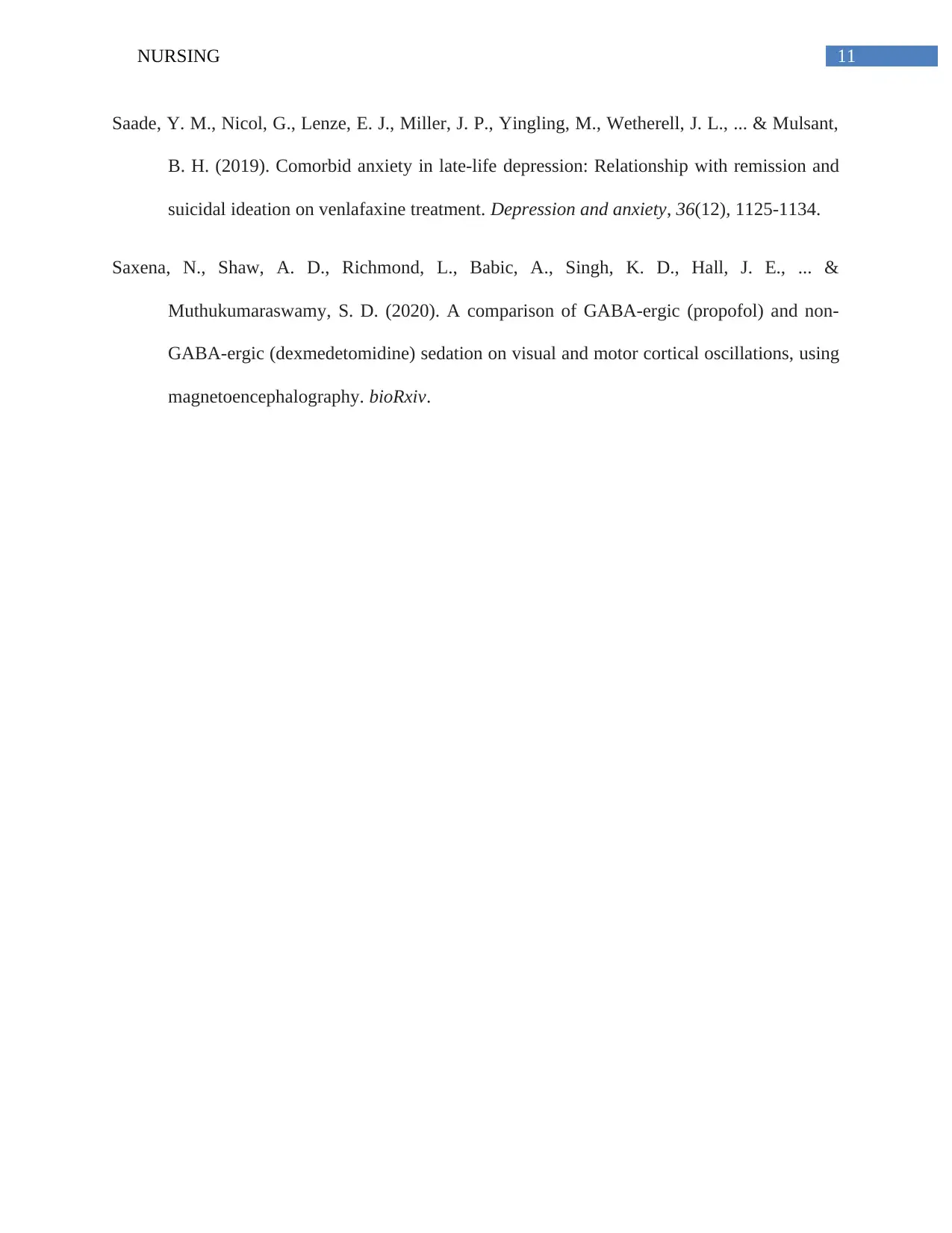
11NURSING
Saade, Y. M., Nicol, G., Lenze, E. J., Miller, J. P., Yingling, M., Wetherell, J. L., ... & Mulsant,
B. H. (2019). Comorbid anxiety in late‐life depression: Relationship with remission and
suicidal ideation on venlafaxine treatment. Depression and anxiety, 36(12), 1125-1134.
Saxena, N., Shaw, A. D., Richmond, L., Babic, A., Singh, K. D., Hall, J. E., ... &
Muthukumaraswamy, S. D. (2020). A comparison of GABA-ergic (propofol) and non-
GABA-ergic (dexmedetomidine) sedation on visual and motor cortical oscillations, using
magnetoencephalography. bioRxiv.
Saade, Y. M., Nicol, G., Lenze, E. J., Miller, J. P., Yingling, M., Wetherell, J. L., ... & Mulsant,
B. H. (2019). Comorbid anxiety in late‐life depression: Relationship with remission and
suicidal ideation on venlafaxine treatment. Depression and anxiety, 36(12), 1125-1134.
Saxena, N., Shaw, A. D., Richmond, L., Babic, A., Singh, K. D., Hall, J. E., ... &
Muthukumaraswamy, S. D. (2020). A comparison of GABA-ergic (propofol) and non-
GABA-ergic (dexmedetomidine) sedation on visual and motor cortical oscillations, using
magnetoencephalography. bioRxiv.
1 out of 12
Related Documents
Your All-in-One AI-Powered Toolkit for Academic Success.
+13062052269
info@desklib.com
Available 24*7 on WhatsApp / Email
![[object Object]](/_next/static/media/star-bottom.7253800d.svg)
Unlock your academic potential
© 2024 | Zucol Services PVT LTD | All rights reserved.





